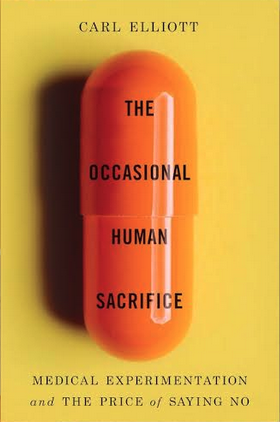The Unexpected Plight of Whistleblowers

If you’re looking for a book where good triumphs over evil, The Occasional Human Sacrifice: Medical Experimentation and the Cost of Saying No, isn’t it. But hear me out: you were looking for the wrong book, and you will understand why if you give this a read.
Carl Elliott, Professor of Philosophy and Medical Ethics at the University of Minnesota, provides a nuanced look into the history of medical research scandals and the whistleblowers who bring these stories into the light of day. He’s not opposed to celebrating the victories that result from whistleblowing. It’s just that the wins aren’t as clear cut as most of us would expect, especially given the horrors exposed.
The book revisits well-known medical scandals, such as the Tuskegee experiments from 1932-1972, in which poor black men with syphilis were studied to document the disease’s long-term effects – even after the 1947 discovery of a treatment (penicillin) that would have cured them. It also presents less familiar cases, such as the story of Willowbrook institution, where from 1956-1971 researchers intentionally infected children with developmental disabilities with hepatitis to study its spread and effects. Medical research goes horrendously off course in each of the six case studies Elliott examines, and it’s not surprising that the majority of the “occasional human sacrifices” are those with less power in society: women, people with terminal conditions, disabled people, poor people, people of color – these lives are put at risk for the greed, ego, stupidity, or laziness of the researchers.
What is unexpected about these stories is that the whistleblowers, too, are part of the sacrifice. Elliott’s writing shines as he recounts his work getting to know these whistleblowers from 2016-2023, a challenging time for international travel and research. Invariably, the whistleblowers start with more power than the research subjects being harmed, yet speaking out makes them surprisingly vulnerable. They become stigmatized and shoved to the margins, professionally and mentally wrecked. Bitterness tears them apart, and they struggle to make sense of a world in which exposing corruption and abuse doesn't immediately shut down the perpetrators. These battles take years and often destroy the lives of the whistleblowers along the way, leaving many with PTSD, paranoia, addiction, and guilt that they didn’t do enough. Meanwhile, the high-powered bad actors rarely see more than a slap on the wrist, sometimes winning awards in their field even after their scandals come to light.
If anyone has a right to look at the topic of medical whistleblowers through such an unblinking lens, it’s Elliott, who begins the book with a vulnerable and critical inward look that questions his own motives as a whistleblower. He battled the University of Minnesota’s Department of Psychiatry for seven years over the corrupt intake process of a pharma-funded drug trial, which resulted in the violent suicide of Dan Markingson. (There’s a lot more to this story, but I’ll push you to read the book.)
Elliott was my academic advisor while this was going on, and when he first told me about it, I was immediately pulled into the fight – although as a graduate student I couldn’t do much more than co-signing letters and writing posts to raise awareness. The university retaliated against Elliott by cutting off his access to students and teaching, but this only gave him more time to travel around the country lecturing about the Markingson case. Elliott’s efforts finally led to an independent audit report from the Minnesota legislative auditor, which confirmed everything he had been saying. Yet very little trouble came to the people responsible, and even less was done for the family of Markingson.
Reading Elliott’s retelling of the saga in the book, I struggled. I had to own that I had wrapped up the story with a much happier ending than what had actually transpired. I’d recently shared about the case with a friend, and the gist of my retelling was: “Carl was raised up as the hero – he was finally seen as right! The irresponsible and greedy faculty lost their jobs! The university issued an apology!” Not quite. I was embarrassed to realize that I’d put my own Disney princess twist on it. As Elliott shows, the desire to see whistleblower stories have happy endings is heartbreakingly common and nearly always inaccurate. We just don’t understand the real story of whistleblowers. Elliott is one himself, he’s now spent years studying it, and he struggles all the way to the end of the book to make sense of it.
So you’ve been warned – the stories that Elliott chronicles are bleak. The whistleblowers sacrificed in big ways that they didn’t anticipate before blowing the whistle. But learning about the high costs of their unappreciated efforts is a worthwhile journey. It’s a small step toward building pressure on our fields and institutions to do better.
Join us for a talk with the author on Tuesday, May 28 at 3:30pm PT, online or in person at San Francisco State University. Details and registration at: tinyurl.com/BookTalkMay28
Emily Beitiks is Interim Director of the Paul K. Longmore Institute on Disability at San Francisco State University.



